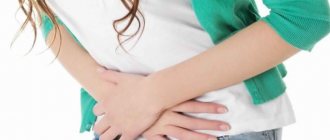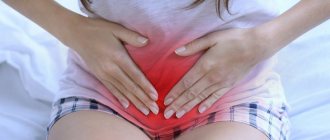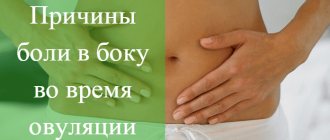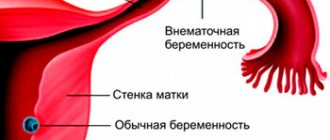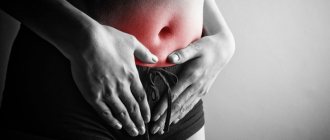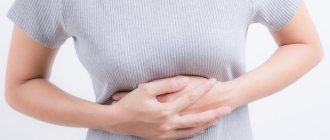Pain in the lower abdomen for most women during menstruation is a normal phenomenon that they encounter every month. The most severe pain during menstruation is felt in the first days, and starting from the third day, its intensity gradually subsides. Menstrual pain is nagging in nature, but the pain syndrome has the form of colic and acute pain in the lower abdomen. This phenomenon is usually called dysmenorrhea; it most often affects young, nulliparous women, as well as women who are overweight and have harmful addictions.
Dysmenorrhea is diagnosed when a woman’s painful dysregulation is accompanied by a whole range of pathological symptoms, including headaches, nausea, weakness and fatigue. For some women, severe pain in the lower abdomen during menstruation prevents them from doing household chores and significantly reduces their productivity, so you should know the main reasons that provoke pain and be able to cope with them.
In this article you will learn why your stomach hurts during menstruation, and what to do if the sensations are very strong.
What can hurt and accompanying symptoms
Critical days are a normal process that occurs in all women of reproductive age every month, starting from puberty and until the onset of menopause, when reproductive function declines. During menstruation, a woman feels a certain discomfort and there is an additional need to comply with hygiene standards.
Very often, the process of rejection of the inner layer of the uterus is accompanied by menstrual pain, they resemble short-term cramps in the lower abdomen, which disappear on the second day of menstruation.
Both biological and mechanical processes are involved in cleansing the body during regulation. The nervous system sends a signal to the muscles of the genital organs, causing them to spasm. What actually hurts during menstruation is the contracting walls of the uterus, which thus push out the exfoliated endometrium and blood through the vagina. The whole process is controlled by impulses that pass through nerve cells. Pain is felt only when there is insufficient nutrition of the nerve cells, as a result of which they stop the nerve impulses.
Usually, pain begins to be felt on the eve of menstruation, in which case we can talk about the presence of algomenorrhea or dysmenorrhea. This is the medical name for a condition in which the stomach hurts very much during menstruation. The nature of the pain is usually aching, stabbing or cramping; the woman’s lower abdomen pulls, and the pain can also radiate to the kidney area or lower back. Menstruation is characterized by mild pain; if it intensifies, you should definitely seek help from a doctor, since painful periods are the only symptom of some dangerous gynecological diseases, including oncology. But even in the absence of obvious causes, severe pain in some cases may require medical treatment.
If the cause of pain during regulation is diseases and infections in the organs of the reproductive and urinary systems, then accompanying symptoms may be observed:
- pain in the back and sacral area;
- heaviness and pain in the lower extremities;
- nausea with vomiting;
- diarrhea during menstruation;
- general weakness and poor health;
- emotional swings, in which aggressiveness and irritability are replaced by complete apathy.
The intensity of pain varies for each woman and depends on the characteristics of the body, its general condition, heredity and the woman’s lifestyle. About 32% of women aged 18 to 25 years experience very severe pain, which has a detrimental effect on performance and disrupts their normal lifestyle. At the age of 25-35, this percentage decreases slightly and amounts to 28%, and at the age of 35-45, almost 40% of the fair sex experience monthly pain. The choice of treatment for this pathology will depend on the type of dysmenorrhea and its severity.
https://youtu.be/5lu-xgrVf6s
Ailments due to illness
Almost every woman has a stomach ache during menstruation. However, for the vast majority, the malaise does not cause any particular inconvenience. They have moderate pain in the lower abdomen or mild discomfort. But some women have to suffer seriously. More often this condition occurs in young girls.
Pain in the lower abdomen during menstruation is a normal, physiologically determined condition. The lower abdomen hurts due to contractions of the uterus during the monthly rejection of the inner layer of its cavity. Changes in the female body before and during menstruation are accompanied not only by pain, but also by other ailments. The woman becomes nervous and irritable, she may have a headache, and there is increased sensitivity to odors. During this period, she is more vulnerable to infections, so she often feels like she has a cold. In healthy women, all these signs appear moderately and do not lead to loss of ability to work.
A condition in which pain and other ailments manifest themselves clearly is called algodismenorrhea. Women suffering from algomenorrhea suffer not only from unbearable pain. They become weak, their blood pressure drops, their sleep is disturbed, they lose their ability to work, and their vitality decreases. Nausea and severe vomiting, diarrhea, increased sweating, dizziness and even loss of consciousness may occur.
Such symptoms, especially if they appear with enviable regularity, may indicate health problems. In this case, you should not postpone a visit to the doctor.
So, why does my stomach hurt so much?
Classification and degrees of deviations
Most often, the stomach hurts severely on the first day of menstruation, and starting from the second day, the pain subsides. If a woman experiences severe pain on the eve of menstruation and accompanies all critical days, then a diagnosis of “dysmenorrhea” is made. Depending on the causes of occurrence, two types of pathology are distinguished:
- primary dysmenorrhea or functional. It is diagnosed when the body produces an increased amount of prostaglandins, which cause excessive contraction of the uterine muscles. In this case, painful sensations appear on the eve of menstruation and continue for another 3-4 days. This type of dysmenorrhea is typical for girls 16-25 years old. Associated symptoms include headache, diarrhea and nausea. Since pain in this case is not associated with any pathologies, ultrasound will not show any developmental anomalies or lesions in the pelvic organs. The situation may improve with age or after the birth of a child;
- secondary or acquired algomenorrhea. It appears most often in women after 30 years of age. The cause of such dysmenorrhea can be excessive excitability of the nerve roots during uterine contractions, inflammation and pathology in the organs of the reproductive system, and endometriosis. Painful sensations can also be the body’s reaction to the intrauterine device.
In the case when, over the years, pain during menstruation remains at the same level of intensity, then they are usually called compensated, but if they increase with each cycle, these are decompensated pain.
Depending on the intensity of menstrual pain, there are 4 degrees of dysmenorrhea:
- Zero degree. The pain is mild, tolerable and does not require painkillers.
- The first degree is characterized by moderate pain, which is accompanied by depression, digestive system disorders and headaches. You may feel slightly unwell and drowsy, but the woman remains incapacitated and is still physically active. In 40% of women, this stage of algomenorrhea manifests itself from the first menstruation. After childbirth or with age, the situation changes, and until the end of reproductive function, about a quarter of all women live with moderately painful periods. If the pain is at the same level, then no measures need to be taken; 1-2 painkiller tablets are enough in special cases. If they increase, mandatory consultation with a specialist is required.
- The second degree is severe menstrual pain, accompanied by nausea, chills, dizziness, migraine-like pain, general weakness and irritability. Analgesics and sedatives help correct the situation.
- The third degree of dysmenorrhea is diagnosed with very severe pain in the lower abdomen, which begins 2 or even 3 days before the regulation, and only goes away with its end. Additionally, the body temperature may rise, severe headaches may occur, which can provoke vomiting, the heart rhythm may become erratic, and heart problems may appear. A woman may faint, lose her ability to work, and ordinary painkillers from the home medicine cabinet cannot cope with the situation. This is a very dangerous degree of algomenorrhea, which can lead to disruption of the menstrual cycle, and even cause infertility. Often at this stage of dysmenorrhea, concomitant diseases of the reproductive system or nearby organs are also diagnosed.
Diagnosis and treatment
Almost every woman experiences pain in the abdomen during premenstrual syndrome; this is considered a physiological norm. But if your stomach hurts quite often during menstruation, this may indicate disorders in the digestive system, so you should consult a doctor who will find out the cause of this process.
If the gynecologist does not find out the cause, then you should contact a gastroenterologist. Once the diagnosis is established, a specific treatment method is prescribed.
In some cases, a psychologist is involved in the treatment of stomach pain during menstruation, since the pain may arise due to psychological problems.
Why does pain occur during menstrual periods?
In adolescents, primary algomenorrhea is most often diagnosed, associated with an abnormal position of the uterus or abnormal development of the reproductive organs. Often, after the first birth, pain during menstruation for women with primary dysmenorrhea ceases to cause discomfort.
If dysmenorrhea occurs after puberty, then it is considered to be secondary; such abdominal pain can be caused by various reasons:
- uterine contractions. This is the main factor that causes severe pain during the regulative period, even during the menstrual cycle, which proceeds without any disturbances. The contraction of the smooth muscles that make up the walls of the uterus is caused by the hormone prostaglandin; the higher its level, the higher the contractility of the uterine muscles. Normally, this hormone is responsible for the timely cleansing of the uterus from exfoliated endometrium, but with its increased concentration, intense muscle contractions cause a woman to feel pain. Not only the intensity, but also the nature of the pain depends on this hormone;
- Critical days are especially painful if a woman has genital diseases. Unbearable pain during regulation occurs with endometriosis, uterine fibrosis and inflammatory processes in the organs of the reproductive system. Pain syndrome can signal an existing disease, or be a consequence of an already eliminated gynecological illness;
- A deficiency of certain microelements can lead to disruptions in the menstrual cycle, resulting in painful periods. In this way, a lack of calcium and magnesium in a woman’s body may occur;
- genetic predisposition. If a woman’s closest relatives suffered from severe menstrual pain, then she too is at risk. Not only pain sensations, but also the pathologies that cause them could be inherited;
- An imbalance of hormones and, as a result, painful periods can be caused by stress and poor nutrition.
If pain during menstruation does not go away even after taking painkillers, they can be triggered by the following factors:
- bending and displacement of the uterus. If these are congenital anomalies, then there is a high probability that the pain will go away after childbirth;
- avitaminosis;
- a sharp drop in progesterone levels;
- cysts and polyps in the ovaries;
- spontaneous abortion;
- emotional overstrain, state of shock;
- adhesions;
- polycystic ovary syndrome;
- hormonal imbalance caused by an overactive thyroid gland;
- intrauterine device;
- excessive excitability of the nervous system;
- pelvic overload syndrome;
- cervical stenosis;
- recent operations, including abortion, childbirth;
- sedentary lifestyle;
- malignant tumors.
If the pain during the procedure is tolerable and lasts a short period of time, there is no need to panic, but if the pain is severe, consultation with a specialist is necessary.
Additional examinations
During menstruation, most women experience stomach pain. If you have an unpleasant symptom, you should visit a gynecologist. He will conduct a diagnosis and, if necessary, give a referral to other doctors. You will need to visit an endocrinologist if you have complaints about:
- sleep disturbance;
- causeless weight loss;
- prostration.
Pain during menstruation, accompanied by the listed symptoms, indicates increased activity of the thyroid gland. The pathology provokes the manifestation of irritability and tearfulness. The psychological state worsens. Pathology is diagnosed using ultrasound.
It is important to eliminate the risk of gastrointestinal diseases. The main diagnostic method is endoscopy.
Endoscopy is often prescribed to identify possible gastrointestinal problems.
A patient with gastrointestinal disorders complains of:
- nausea;
- weakness;
- dizziness;
- diarrhea;
- lack of appetite.
The listed signs, accompanied by pain in the abdomen, cause discomfort, so an examination is carried out immediately.
Why does my stomach hurt during menstruation? This video will tell you about it:
Stomach pain during menstruation is one of the manifestations of premenstrual syndrome. But if the pain is too severe, you should consult a doctor.
During menstruation, a woman experiences not only inconvenience. These days are characterized by not feeling very well. It happens that your stomach hurts during menstruation. The pain varies in nature, intensity and duration. It is considered normal if minor pain in the stomach occurs a few days before the start of menstruation.
The reason for this uncomfortable condition is mainly an increase in the level of prostaglandins. During menstruation, pain occurs in 70% of women. As a rule, minor pain is felt as a spasm in the abdominal area. Pain may also be felt in the lumbar region.
May be caused by the following reasons:
- the body's sensitivity to uterine contractions;
- pathologies of the genital organs, incorrect location of the uterus;
- hormonal imbalances;
- increased susceptibility to irritants of the nervous system.
Some women have stomach pain during menstruation due to increased sensitivity to certain foods or intolerance that occurs during this period. Their presence in the diet and stomach, causing upset and nausea.
In addition, the stomach may hurt during menstruation due to improper diet. Therefore, in order to reduce painful manifestations, you should limit the consumption of harmful foods a couple of days before the expected date of your period, giving preference to plant foods.
During the menstrual period, the stomach may also hurt due to existing gastrointestinal diseases. The discomfort can be caused by polyps, gastritis, poisoning and infectious diseases. Sometimes pain is caused by diseases that are not related to the digestive system. For example, pathologies of the cardiovascular system.
For stomach pain, it is recommended to take medications to relieve spasms and enveloping agents. Also, pain in the stomach area can be relieved by medications used to treat ulcers. Before starting any treatment, you should find out what is causing the pain. In addition, you must follow the instructions regarding dosage, dosage regimen, and contraindications.
To avoid stomach pain during menstruation, you must follow some rules.
- Reduce physical activity. Since physical activity stimulates the heart, bleeding becomes stronger, and, consequently, the stomach hurts more. But you shouldn’t completely limit your mobility. Simple yoga exercises, on the contrary, can relieve pain.
- A cold compress will help reduce pain. But it is not advisable to perform such a procedure too often and for a long time, so as not to chill the organs.
- Reception is allowed. Of course, before taking any pills, you should consult your doctor.
- When not only the stomach, but also the intestines hurt, if the sensations are pronounced, lasting and are complemented by other symptoms, then you definitely need to undergo an examination and find out what caused the painful condition.
Perhaps it makes sense to be examined not only by a gynecologist, but also by a gastroenterologist. If the pain becomes too severe, immediate medical attention should be provided.
If menstruation is accompanied by pain in the stomach, then adjustments should be made to the daily diet for this period. You need to give up spicy, fried and fatty foods, mayonnaise, sauces and other unhealthy foods. Carbonated drinks, alcohol and caffeine will not be beneficial.
It is worth noting that the caffeine contained in coffee stimulates the production of hydrochloric acid, and this has a negative effect on the stomach. To prevent menstruation from being accompanied by an uncomfortable state, it is necessary to eat steamed or boiled lean meat, low-fat fish, boiled vegetables, vegetable purees, and so on during this period.
The menu should be balanced, but mainly dietary, so that the load on the stomach is less. It is worth giving preference to products containing calcium and magnesium, substances that relieve pain during menstruation.
At the same time, it is necessary to limit consumption or completely abandon flour products, gas-forming dishes, nuts, citrus fruits, and chocolate. In this case, the food should be warm, it should be taken in small portions, about six times throughout the day.
Drinking regime
Raspberry and chamomile infusion (tea) will help relieve painful symptoms of menstruation. Infusions of lemon balm and oregano also have many beneficial properties. With their help, you can reduce pain or eliminate it completely. Ginger tea is effective in relieving stomach pain during menstruation. It is recommended that you drink frequently and plentifully during this period - plain water, fruit drinks, herbal decoctions, teas, fruit juices, compotes.
If a woman has a stomach ache during her period, then, as a rule, the pain is caused by a change in the activity of the endocrine system inherent in this period. There may be other reasons, related to violations in other systems. Be that as it may, in order to alleviate the condition, you should adhere to a diet.
First of all, when developing a dietary diet, it is necessary to take into account the requirements of nutritional culture. That is, determine a specific time for eating. Make meals frequent, but it is advisable to reduce portions. To prevent exacerbation during menstruation, you need to provide three meals a day.
In addition, you should separate the intake of liquid foods from the intake of solid foods. The diet should be balanced and contain foods rich in silicon, calcium, and magnesium. Vegetables, fruits, cereals and other things that will ensure proper nutrition must be present on the menu.
It is better to keep breakfast light. If stomach pain is caused by the presence of an illness, then the restrictions will be more stringent. During an exacerbation of the disease, food taken should be at room temperature. Too hot, as well as too cold, is not desirable.
Diagnostics
To determine the exact reason why a woman experiences severe pain during menstruation, it is necessary to undergo a comprehensive examination. It must include the following activities:
- an oral survey, during which the gynecologist draws up an overall picture and makes an assumption about the possible cause of menstrual pain;
- gynecological examination in a chair and palpation of the mammary glands;
- Ultrasound examination of the organs of the reproductive system;
- blood tests for hormones;
- a smear for flora and cytology, the latter will help determine the presence of sexually transmitted diseases.
In some cases, hysteroscopy or laparoscopy may be necessary, as well as additional consultations with specialists (surgeon, endocrinologist, psychologist, etc.).
Diagnostic measures
What to do if your stomach hurts a lot during menstruation? Of course, consult a doctor. He will ask the patient about the sensations she experiences, as well as when, with what intensity and frequency her lower abdomen hurts, whether there have been gynecological diseases, surgical interventions, abortions or childbirth before, how puberty went, what heredity is. Already at this stage of diagnosis, it is possible to assume why severe pain is observed during menstruation.
An examination by a gynecologist and an ultrasound examination of the pelvic organs will detect changes. To confirm the diagnosis, the doctor will prescribe the patient a colposcopy (examination of the vagina and vaginal part of the uterus using a colposcope) or hysteroscopy (examination of the uterine cavity using a hysteroscope). Colposcope and hysteroscope are medical devices that allow detailed examination of the inner surface of the vagina and uterus, respectively.
During the examination, the gynecologist will take a smear from the vagina, cervical canal and urethra for examination. The woman will be given a blood test to check hormone levels and general blood and urine tests. In some cases, laparoscopy may be necessary. This is a method of direct optical examination of the abdominal organs. Diagnostic laparoscopy involves two small punctures into which manipulative instruments are inserted.
In addition, the doctor will definitely refer the patient to a consultation with a psychotherapist or psychologist.
When to see a doctor
If the stomach hurts very much during menstruation, this may be one of the signs of serious problems with the woman’s health, and without the help of a gynecologist it will not be possible to eliminate them on your own. You need to see a specialist in the following cases:
- due to the pain, performance decreases so much that the woman is forced to take a day off from work and lie in bed;
- if your period has been going on for 2-3 days, and the pain does not decrease in intensity;
- bleeding has been profuse for more than 2 days, and there are large, dark clots in the discharge;
- if a woman has been systematically taking hormonal contraceptives for a long time, and pain during regulation does not reduce its intensity;
- if painful periods begin to bother a mature woman;
- if painkillers and antispasmodics are not able to calm the pain;
- if the intensity of bleeding during regulation only increases;
- when, in addition to pain in the lower abdomen, there is a headache, nausea and diarrhea;
- the menstrual cycle is disrupted;
- the woman lost weight dramatically.
If you have the symptoms listed above, you should immediately seek help from a specialist who, after a comprehensive diagnosis, will be able to determine the cause of the pain and prescribe the correct treatment.
Why does my stomach bother me before my period?
Why does my stomach hurt before my period and when is it acceptable? If a girl does not have health problems, menstruation should not provoke pain. PMS can only cause nagging or aching discomfort, nothing more. But if any gastrointestinal pathologies are present, the pain becomes more pronounced and is often accompanied by pain in the epigastric area.
As a rule, most women experience stomach pain before menstruation 10 days or 2 weeks before menstruation, and it may go away along with the regula. Please note that many pathologies of the reproductive organs and disruptions in the endocrine system are very similar to PMS, so it is necessary to regularly visit a doctor for diagnosis.
In terms of symptoms, early pregnancy is also very similar to PMS. A characteristic feature is a delay in menstruation or implantation bleeding, which many girls confuse with the onset of menstruation.
VSD (vegetative-vascular dystonia) can cause discomfort in the stomach before menstruation. In addition to the fact that this disease negatively affects the functioning of the heart, it also has a detrimental effect on overall well-being and the circulatory system. As a result of this, the uterus increases in size, the endometrium becomes loose and swells due to an active rush of blood. The amount of progesterone increases and estrogen decreases, causing nausea, vomiting and loose stool. A healthy diet and vitamin complexes will not help get rid of such problems; you only need highly qualified specialist consultation and appropriate treatment.
Ways to reduce pain
Experts say that any pain cannot be tolerated, because it not only has a detrimental effect on the emotional state, but can harm both physical and mental health. If a woman experiences severe pain during regulation, first of all it is recommended that she consult a gynecologist, but if this is not possible, there are some ways to help with pain during regulation:
- Thermal procedures perfectly relieve muscle spasms, but they cannot be used in inflammatory or purulent processes, as well as in inflammation of appendicitis. If you do not know the exact cause of severe menstrual pain, then there is no need to experiment with warming procedures. If the cause is muscle spasm, then a warm heating pad will be the best help for pain during menstruation. It is applied to the lower abdomen for a quarter of an hour, but no more than twice a day. A more gentle method of warming up is to apply a warm diaper, which is ironed on several sides;
- water procedures. A hot bath is relaxing, but during regular periods it is better to replace it with a short warm shower. This procedure will eliminate fatigue and relieve pain, while you can additionally massage your stomach with a washcloth to relax the muscles and ease the spasm;
- you can make a compress with sea salt and apply it to the lower abdomen, this will remove pain during regulation;
- massage using a warm mala containing warming additives or essential oils, which are preheated in a water bath to body temperature. Essential oils of saffron, bergamot and grapefruit relieve spasms, but you can replace them with regular baby massage oil. Before massage, be sure to measure the heating temperature of the oil to prevent thermal burn of the massaged area. Massage movements along the abdomen and lower back should be done clockwise, this will reduce pressure on the abdominal cavity. If a woman does not have allergies, then you can rub a composition of essential oils into the lower abdomen and lower back throughout the entire period, which includes 4 drops of clary sage oil, 5 drops of marjoram and yarrow oil and 50 ml of St. John's wort oil;
- if painful periods are caused by dehydration, which often accompanies heavy menstrual blood loss, then the treatment is simply to normalize the drinking regime. If there is a lack of fluid in the body, pain in the lower abdomen will be dull or sharp, but in no case cramp-like. Typically, pain of this kind is not too intense, but it may well cause discomfort for women with a low pain threshold. You can replenish the lack of fluid with spring water, still mineral water, teas and herbal infusions, berry compotes and dried fruit decoctions. You can drink fresh fruit, but it is better not to drink alcohol, strong tea, coffee and cocoa;
- It is useful not only throughout the entire cycle, but also during regular periods to engage in not too intense physical activity, which improves tone and eliminates spasms - Pilates, gymnastics, yoga, morning exercises and swimming;
- some experts recommend applying an ice pack to the lower abdomen, but for no more than 10-15 minutes; this advice is not supported by all gynecologists, so before using it, you should consult with your doctor;
- Physiotherapeutic procedures – electrophoresis, acupuncture, auto-training, psychological therapy, etc. – can cope with menstrual pain;
- you need to improve your psycho-emotional state, relax, for this you can read a book or watch an interesting film, go to the cinema or spend time in the company of a loved one. Positive emotions can reduce the intensity of pain;
- assume the fetal position. This position relieves spasms and relaxes the muscles. For a positive effect, a woman needs to lie on her side, pull her legs up to her chest and lie down, or better yet, sleep.
In especially severe cases, treatment of pain during menstrual periods cannot be done without medications.
Drugs
In some cases, in order to cope with pain during regula, the doctor prescribes painkillers for the woman. Medicines from several groups with different mechanisms of action are usually prescribed:
- gestagens;
- hormonal contraceptives in tablet form;
- non-steroidal anti-inflammatory drugs.
The first group of drugs affects secretory changes in the mucous layer of the uterus, but does not affect ovulatory function. Progesterone and testosterone are actively used. These artificial hormones reduce uterine tone and the amount of prostaglandins produced, and reduce the excitability of the nerve roots located in the uterine muscles.
The use of hormonal contraceptives has a beneficial effect on a woman’s hormonal levels and normalizes her menstrual cycle. Birth control pills suppress ovulatory function, reduce the intensity of menstruation, and suppress nervous excitability and uterine tone. Therefore, with systematic use of oral contraception, menstrual pain is significantly reduced. Progestins and oral contraceptives have a long-lasting effect.
If women have a contraindication or excessive sensitivity to hormonal drugs, for menstrual pain, the doctor may prescribe non-steroidal drugs that reduce the level of prostaglandins, but the effect of their use will be observed for 2-6 hours. This group of drugs includes Mig, Diclofenac, Ketoprofen, Nimesil, Ibuprofen, Nurofen Express, Next, Ibufen.
There are a number of medications that experts recommend taking to get rid of menstrual pain:
- antispasmodics. They weaken spasms of smooth muscles and blood vessels. The most famous medications from this group are Drotoverine and No-shpa. To relieve spasms, it is enough to take 1 tablet; you can repeat the dose 2-3 times a day. You can also use intramuscular injections, they relieve pain faster. The antispasmodic Papaverine has a milder effect; it is produced in the form of rectal suppositories. It must be placed in 1-2 candles for 3-5 days, it has a cumulative effect, so you should not expect a lightning-fast effect;
- if, in addition to pain, there are other unpleasant symptoms, experts recommend using complex-action drugs that not only relieve pain, but also eliminate spasm and inflammation. This group of drugs includes Spazmalgon and Pentalgin;
- if pain during regulation provokes overexcitation of the nervous system, sedatives may be prescribed (Persen, Fitosed).
It is worth mentioning separately about the well-known Analgin. These tablets were previously used to relieve any pain. Most women still use it for menstrual pain, although Analgin has too many side effects, which are eliminated in modern analogues. Since this drug can cause bleeding and reduce the production of white blood cells, it should only be used if other medications are ineffective. For mild pain, you can use Paracetamol; women choose this medication because of its rapid action, although for severe pain it is useless.
Any medication whose action is aimed at eliminating pain has a number of contraindications and side effects, so it should be prescribed exclusively by a doctor, based on the diagnosis and general health of the patient.
Help from folk remedies
There are many folk remedies that can soothe menstrual pain; they can be easily prepared at home. It is important to remember that taking any medicine from alternative medicine should be agreed with your doctor.
Let's talk about the most effective folk recipes to help cope with menstrual pain:
- ginger tea. Ginger root contains many phytoncides, esters and glycosides that can relieve pain and have an antibacterial effect. To prepare tea, you need to take 1 teaspoon of grated, fresh or half a dry ginger root, pour boiling water, add a pinch of cinnamon and leave for 6-7 minutes. The drink can be supplemented with a lemon balm leaf, a slice of lemon or sweetened with sugar. A woman will be able to feel the effect of tea within half an hour. This recipe is not suitable for women with acute diseases of the digestive system and blood diseases. Ginger tea should also not be drunk during heavy periods;
- mint tea with lemon balm. This herbal mixture has a pronounced analgesic effect. To prepare the drink, mix 2 g of dry or fresh peppermint and lemon balm leaves, add 4-5 drops of lemongrass oil and pour a glass of boiling water. Tea is brewed for 6-7 minutes. Schisandra can be replaced with 5 g of orange, lemon or other citrus zest. Drink tea daily until the regulation is complete. It can serve as a prophylactic; for this purpose it is taken daily in the morning and a couple of hours before bedtime;
- chamomile tea with raspberries. In this recipe, it is raspberries that are used, and not leaves, since the latter, on the contrary, help to strengthen uterine contractions. A tablespoon of pharmaceutical chamomile poured into a glass of boiling water, to which 15 g of dried raspberries is added, will help eliminate muscle spasms in the uterus and thereby relieve pain. The drink is infused for 10 minutes, then a little cinnamon and honey are added. This tea will not only soothe and relieve spasms, but will also have a general strengthening effect on the female body;
- Herbal decoctions with horsetail and bearberry will help get rid of pain, but have a diuretic effect. You need to drink this drug before your period;
- Tea with catnip will help calm and relax the uterine muscles;
- An infusion of oregano will help get rid of cramps not only in the uterus, but also in the intestines, this significantly alleviates a woman’s condition during her period. A spoonful of dry raw materials is poured into a glass of boiled water and infused for some time, taken three times a day before meals;
- A decoction of viburnum bark shows good effectiveness in the fight against menstrual pain. 4 tsp. dry bark, add 0.25 liters of water and boil for half an hour. Drink a tablespoon before meals;
- An infusion of parsley and strawberries works well.
Physical exercise
Experts have developed a whole range of physical exercises that allow you, without the use of medications, to get rid of not only severe menstrual pain, but also the accompanying symptoms. The following exercises can be performed every day for prevention and during menstruation to relieve pain:
- lying on your back, bend your knees and place your feet on the floor. Hands are placed along the body with palms facing the floor. On a short exhalation, a smooth deflection of the abdomen is made for several minutes. The muscles completely relax. Repeat 4 times;
- you need to lie on your back with your buttocks positioned as close as possible to the wall, and your legs raised up perpendicular to the floor, then your legs bend at the knees. You need to stay in this position for 4-5 minutes;
- You need to lie on your back, straighten your legs, pull one leg up to your chin, and leave the other on the floor. You need to spend 2-3 minutes in this position, and then do the exercise on the other leg;
- you need to get on all fours and lean your elbows on the floor, you need to hold your head between your hands. You need to stay in this pose for 2-3 minutes. A similar exercise can be done lying on your back;
- You need to lie face down on the floor, bring your feet together and strain your knees. As you exhale, the body rises, the head is thrown back and the buttocks contract. You need to stay in this position for half a minute. As you exhale, return to the starting position.
These exercises are suitable for those who are contraindicated for drug treatment, but they should be performed only as prescribed by a doctor in cases where a woman has a spinal disorder and is diagnosed with arterial hypertension.
What else can cause pain?
If your stomach hurts after the end of your period, then you need a gastroenterologist.
Above, the causes of pain were discussed, which are directly or indirectly related to the menstrual cycle. But can a stomach ache during menstruation not be due to menstruation? If painful sensations arise for the first time, they are not necessarily associated with the menstrual cycle. One of the following may be the case:
- food poisoning due to unwanted microbes and bacteria entering the body. In addition to pain, there should be other symptoms such as fever, nausea and diarrhea;
- problems with the gastrointestinal tract. Pathologies of the gastrointestinal tract do not depend on the menstrual cycle, but can worsen during this period;
- Stomach pain during menstruation can occur due to alcohol abuse. Again, due to special days, sensitivity to pain that was previously invisible may increase;
- For some girls, menstruation acts as a catalyst for the desire to eat a lot. However, overeating is another cause of stomach pain.
Prevention
To avoid having to treat dysmenorrhea, it is better to initially follow simple preventive recommendations:
- do not drink alcohol, especially during menstruation;
- quit smoking;
- avoid hypothermia, overheating and any stressful situations for the body;
- do not eat junk food, spicy and very hot dishes, drink no more than 2 cups of coffee a day;
- consume fermented milk products rich in calcium (yogurt, fermented baked milk, kefir) every day;
- have an active sex life. This helps normalize blood circulation and relaxes the muscles of the genital organs;
- you should move more, walk in the fresh air, if possible, do yoga, swimming or gymnastics;
- daily baths with sea salt, alternating with cold showers, will help improve blood circulation in the pelvic organs;
- consume vitamin complexes containing calcium and magnesium;
- remove from the diet foods that cause fermentation and bloating;
- You should regularly visit a gynecologist at least once a year, and if you experience any unpleasant symptoms, you should immediately seek medical help.
A bar of chocolate, which contains calcium and magnesium and stimulates the production of endorphin, the hormone of happiness, will help improve your mood during menstruation.
How to remove pain or reduce its intensity
There are several approaches that can minimize pain, remove it, or help you understand that you cannot do without a doctor.
To begin with, during menstruation you need to reduce your physical activity. At the same time, it is necessary to act without fanaticism, because someone may perceive this recommendation as a call to lie on the couch all the time. The same Pilates and yoga have a beneficial effect on the body and can reduce pain if you choose the right exercises. Therefore, active loads need to be removed, but physical activity cannot be completely neglected.
The self-medication method of applying a cold or hot heating pad to the stomach is very dangerous. This can lead to hypothermia of the organs or provoke an inflammatory process.
Most women use painkillers that help relieve stomach pain during menstruation and make it easier to survive this period. You should consult your gynecologist about specific medications.
If the pain is acute, intensifies or does not go away for a long time, then you should consult a doctor not for advice, but for treatment. Another reason to consult a doctor is the presence of other painful symptoms in addition to stomach problems. Perhaps the doctor diagnoses a disease that has nothing to do with menstruation.
You can reduce and survive stomach pain through regular rest. If you lie down on a comfortable bed for a while, you should feel better. A walk in the fresh air will be a good alternative if you cannot lie down.
How to distinguish premenstrual syndrome from pathology
Each woman has her own set of symptoms by which she learns about the imminent arrival of menstruation. Pain in the intestines makes itself felt if there are problems in the gastrointestinal tract. If everything is normal with the digestive system, a cramping, nagging pain is felt in the lower abdomen, at the level of the uterus and ovaries.
A problematic intestine reacts sharply to hormonal fluctuations, discomfort, rumbling, nausea, pain appears, which radiates throughout the intestines, not only in the lower abdomen. Along with this, the stomach often hurts, since the problem originates from pathologies of the stomach. In this case, a coating appears on the tongue, an unpleasant taste in the mouth, and general malaise. In severe cases, the temperature rises to 38 degrees Celsius or higher. The painful condition is accompanied by chills and fever.
The main difference between the signs of premenstrual syndrome and pathology is the timing of remission. In the first case, the problem disappears after the end of menstruation, in the second it requires additional treatment.
Causes of stomach pain during menstruation
Stomach pain during menstruation can be caused by:
- the body’s reaction to the fact that the uterus is actively contracting;
- existing diseases of the genital organs, or non-standard location of the uterus;
- hormonal imbalance in the body;
- high susceptibility to factors that irritate the nervous system.
Women have to feel pain in the stomach due to the fact that during menstruation the body's sensitivity to certain foods may increase or intolerance may appear. Consumption of such products during menstruation leads to stimulation of the intestinal and stomach walls, after which pain appears. To get rid of this phenomenon, you need to stop eating harmful foods a couple of days before the expected start of your period.
During menstruation, the stomach may hurt if a woman has diseases of the gastrointestinal tract. Anxiety in the stomach can be caused by polyps, gastritis, infectious diseases, or simple poisoning. There are also cases when painful sensations appear due to diseases that are not related to the gastrointestinal tract, for example, heart and vascular disease.
If your stomach hurts during menstruation, it is recommended to take antispasmodics and antispasmodics. However, before taking any drug, you should consult your doctor. He will help you find the root cause of the pain and select the medicine that will need to be taken, following all the doctor’s instructions.
